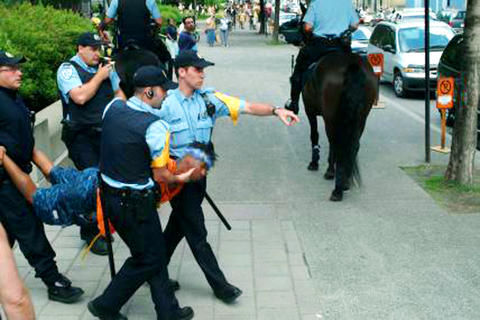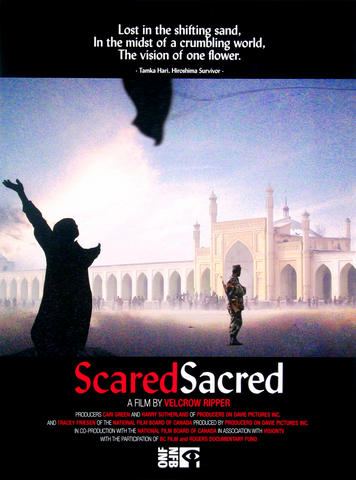In 1948, the General Assembly of the UN adopted the Universal Declaration of Human Rights, which called for the universal recognition of fundamental rights and freedoms of all human beings.
In the following 60 years, Israel, Palestine, the minefields of Cambodia, New York City and war-torn Afghanistan have been the "ground zeros" of the world, producing stories of destruction and survival that both dishearten and inspire.
Some of these stories will be revisited at the Canada Taiwan Human Rights Film Festival, which starts tonight at SPOT Taipei Film House (台北之家:光點電影院) and will also show in Hsinchu City and Kaohsiung County through June.

PHOTO: COURTESY OF THE CANADIAN TRADE OFFICE IN TAIPEI
The event was organized by the Canadian Trade Office in Taipei with curatorial assistance from the National Film Board of Canada, Taiwan Indigenous TV (台灣原住民族電視台) and the Public Television Service (公視). It will highlight the accomplishments and follies of humanity with a lineup of one fictional film and 13 documentaries from Canada and Taiwan. The movies will be grouped under themes ranging from Aboriginal movements and new immigrants to environmentalism and multiculturalism.
Aboriginal Rights Events in Taiwan (原運二、三事) and When Tribes Meet the Nation (當部落遇到國家) document Taiwan's Aboriginal rights movement. In a similar vein, Kanehsatake: 270 Years of Resistance is a powerful account of what has come to be known as the Oka Crisis. In the summer of 1990, the people from the Mohawk tribe stood up against the Quebec police and Canadian army to fight for their right to live on land that belonged to them and their ancestors.
Immigrants' rights are tackled in The Voyage to Happiness (幸福的地圖), which features interviews with female immigrant spouses in 14 Asian cities, including Taipei, Tokyo, Seoul and Ho Chi Minh City. The movie records their struggles to overcome cultural prejudice and earn basic rights.

PHOTO: COURTESY OF THE CANADIAN TRADE OFFICE IN TAIPEI
Just how deeply our prejudices are seated is revealed in Zero Tolerance, in which the lives of minority teenagers in the city of Montreal are portrayed as more difficult than their majority counterparts.
In There and Back, a teenage girl living in Canada learns to accept her double identity as a burden and a treasure after a two-month visit with her Iraqi father in Jordan. Director Paul Emile d'Entremont will hold a question-and-answer sessions after the screenings this weekend at SPOT.
The raging war between humans and nature is eloquently illustrated in Manufactured Landscapes, a documentary on Canadian artist Edward Burtynsky, who is known for photographing landscapes altered by factories, dams and scrap heaps. Following a trip by Burtynsky to China, the film reveals the rarely seen effects of the huge nation's industrial revolution, from the Three Gorges Dam to Shanghai's urban renewal plan. The Refugees of the Blue Planet takes a look at the little-known plight of environmental refugees who are displaced and forced to leave their traditional ways of life due to the degradation of the environment.

PHOTO: COURTESY OF THE CANADIAN TRADE OFFICE IN TAIPEI

Oct. 27 to Nov. 2 Over a breakfast of soymilk and fried dough costing less than NT$400, seven officials and engineers agreed on a NT$400 million plan — unaware that it would mark the beginning of Taiwan’s semiconductor empire. It was a cold February morning in 1974. Gathered at the unassuming shop were Economics minister Sun Yun-hsuan (孫運璿), director-general of Transportation and Communications Kao Yu-shu (高玉樹), Industrial Technology Research Institute (ITRI) president Wang Chao-chen (王兆振), Telecommunications Laboratories director Kang Pao-huang (康寶煌), Executive Yuan secretary-general Fei Hua (費驊), director-general of Telecommunications Fang Hsien-chi (方賢齊) and Radio Corporation of America (RCA) Laboratories director Pan
The consensus on the Chinese Nationalist Party (KMT) chair race is that Cheng Li-wun (鄭麗文) ran a populist, ideological back-to-basics campaign and soundly defeated former Taipei mayor Hau Lung-bin (郝龍斌), the candidate backed by the big institutional players. Cheng tapped into a wave of popular enthusiasm within the KMT, while the institutional players’ get-out-the-vote abilities fell flat, suggesting their power has weakened significantly. Yet, a closer look at the race paints a more complicated picture, raising questions about some analysts’ conclusions, including my own. TURNOUT Here is a surprising statistic: Turnout was 130,678, or 39.46 percent of the 331,145 eligible party

The classic warmth of a good old-fashioned izakaya beckons you in, all cozy nooks and dark wood finishes, as tables order a third round and waiters sling tapas-sized bites and assorted — sometimes unidentifiable — skewered meats. But there’s a romantic hush about this Ximending (西門町) hotspot, with cocktails savored, plating elegant and never rushed and daters and diners lit by candlelight and chandelier. Each chair is mismatched and the assorted tables appear to be the fanciest picks from a nearby flea market. A naked sewing mannequin stands in a dimly lit corner, adorned with antique mirrors and draped foliage

President William Lai (賴清德) has championed Taiwan as an “AI Island” — an artificial intelligence (AI) hub powering the global tech economy. But without major shifts in talent, funding and strategic direction, this vision risks becoming a static fortress: indispensable, yet immobile and vulnerable. It’s time to reframe Taiwan’s ambition. Time to move from a resource-rich AI island to an AI Armada. Why change metaphors? Because choosing the right metaphor shapes both understanding and strategy. The “AI Island” frames our national ambition as a static fortress that, while valuable, is still vulnerable and reactive. Shifting our metaphor to an “AI Armada”